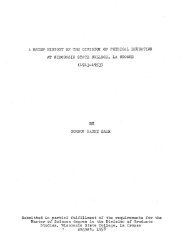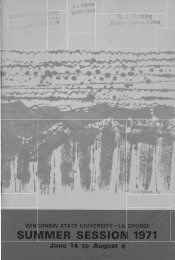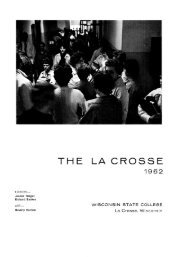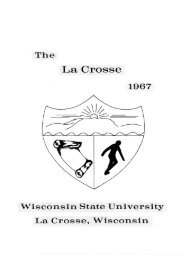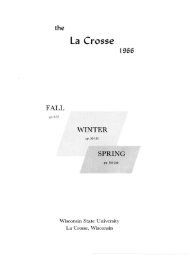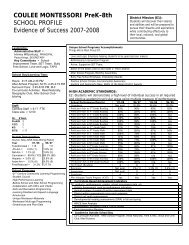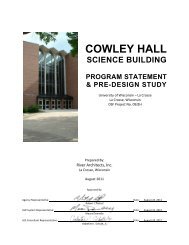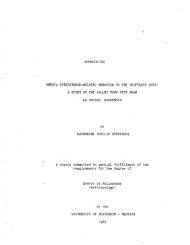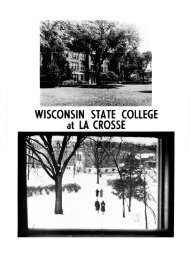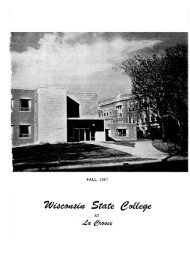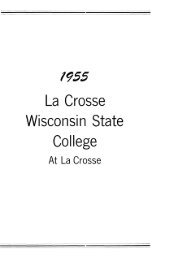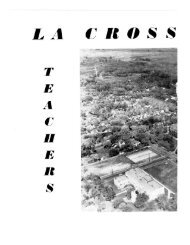Spring 1991 - Digitized Resources Murphy Library University of ...
Spring 1991 - Digitized Resources Murphy Library University of ...
Spring 1991 - Digitized Resources Murphy Library University of ...
You also want an ePaper? Increase the reach of your titles
YUMPU automatically turns print PDFs into web optimized ePapers that Google loves.
Goodbye Basic Studies<br />
ew General Education Program prepa es students for changing world<br />
hat should UW-L students know<br />
when they graduate?<br />
A pretty basic question that deserves a<br />
good answer. But what is the answer? Is<br />
there a common core <strong>of</strong> knowledge that<br />
defines an "educated person?" Does a<br />
UW-La Crosse education prepare students<br />
to live in the world? Can improvements be<br />
made in what we teach and how we teach<br />
to ensure students are getting the best<br />
possible education?<br />
For the past 4Y2 years our faculty have<br />
put this issue on the front burner by<br />
conducting a serious, thorough review <strong>of</strong><br />
the Basic Studies Program. The result is a<br />
major revision. This fall, the new General<br />
Education Program will replace Basic<br />
Studies. A new philosophy, set <strong>of</strong> courses,<br />
list <strong>of</strong> requirements, and spectrum <strong>of</strong><br />
opportunities for all students come with<br />
the change.<br />
It was time for change<br />
The impetus for change was both local<br />
and national. The university Strategic<br />
Planning Committee called for a review <strong>of</strong><br />
the program in 1986, pointing out that it<br />
had been 25 years since any significant<br />
examination <strong>of</strong> Basic Studies had been<br />
undertaken. That call coincided with a<br />
general, nationwide trend to review higher<br />
education curriculums. The task fell to the<br />
Undergraduate Curriculum Committee<br />
(UCC).<br />
That's how Bill Cerbin got involved. As a<br />
committee member, Cerbin recalls that he<br />
originally voted against a UCC review. His<br />
side lost. As the UCC members took up<br />
the issue, something interesting<br />
happened.<br />
"I began to see the review as an<br />
opportunity to think about curriculum and<br />
the purposes <strong>of</strong> a college education,"<br />
remembers Cerbin, an associate pr<strong>of</strong>essor<br />
c:<br />
.§ '"<br />
'0<br />
:t:<br />
:.--. "" "7 '"<br />
Vice Chancellor Carl Wimberly has played<br />
major roles in the university's general education<br />
programs for more than 30 years.<br />
8 UW·l Alumnus <strong>Spring</strong> <strong>1991</strong><br />
<strong>of</strong> psychology. "It was a little like an<br />
evangelical conversion. I really began to<br />
believe in general education as a centerpiece<br />
<strong>of</strong> the undergraduate experience."<br />
Since that initial exposure, Cerbin has<br />
served on the ad hoc committee charged<br />
with revising Basic Studies (the task became<br />
too large for the UCC on top <strong>of</strong> its<br />
other duties). Cerbin chaired the General<br />
Education Committee established by the<br />
Faculty Senate in 1988 to complete the<br />
job.<br />
Along the way, Cerbin has become an<br />
expert on general education.<br />
Committee members read widely about<br />
higher education in general - and general<br />
education programs in particular. "But we<br />
also drew on our own experiences and on<br />
our own undergraduate experiences,"<br />
notes Cerbin. What they learned was<br />
there's no one way to structure a general<br />
education program.<br />
They also discovered that it <strong>of</strong>ten takes<br />
more time to change an existing program<br />
than to start one from scratch.<br />
It took the faculty less than a year to<br />
propose and implement the Basic Studies<br />
Program in 1961. When General Education<br />
takes effect this fall, it will be after a 4V2<br />
year process. "It's harder to change<br />
something than to invent something new,"<br />
explains Cerbin. "We had to overcome<br />
concepts and procedures that have been<br />
long accepted."<br />
It also took the committee a long time<br />
to come up with an acceptable rationale,<br />
and a conceptual framework for the<br />
revised program. According to Cerbin, that<br />
was an essential first step.<br />
"Historically, universities have not made<br />
the case for general education -- institutions<br />
have second-class status with no set<br />
<strong>of</strong> goals or positive purposes," he says,<br />
and points to our own stated purposes for<br />
Basic Studies. The current catalog lists two<br />
purposes: bring students into contact with<br />
different disciplines, and to reduce the<br />
pressure on entering students to choose a<br />
major right away.<br />
"That's not a good rationale, at least it's<br />
not defined in a positive way. It's certainly<br />
not very compelling," adds Cerbin,<br />
"especially when we are trying to make<br />
the case for why all students should go<br />
through this program."<br />
The general view, says Cerbin, is that<br />
general education takes a back seat to a<br />
student's major. Students have viewed<br />
Basic Studies as a set <strong>of</strong> obstacles to get<br />
past before they can do what they really<br />
want to do. Cerbin hopes the new program<br />
will be viewed less as an obstacle<br />
and more as an opportunity.<br />
Instead <strong>of</strong> a two sentence statement <strong>of</strong><br />
purpose, the new General Education Program<br />
is supported by a two-page rationale<br />
and a list <strong>of</strong> 10 well-defined goals. And<br />
that, says Cerbin, provides general education<br />
with the coherence and importance it<br />
deserves.<br />
------- - - - ----<br />
The new program<br />
Others agree that the philosophy behind<br />
the new program sets it apart from the<br />
current Basic Studies Program.<br />
"The strength <strong>of</strong> General Education is in<br />
the philosophy <strong>of</strong> the program," stressed<br />
Linda Host. She chairs the Faculty Senate<br />
which debated, revised and ratified the<br />
new program. "It's a fundamental concept<br />
<strong>of</strong> education from the 80s, a more moderr<br />
idea <strong>of</strong> instructional practice."<br />
The heart <strong>of</strong> that new philosophy is<br />
inquiry-based instruction. All courses<br />
accepted as part <strong>of</strong> the General Education<br />
program are to be inquiry-based.<br />
Inquiry-based courses promote students'<br />
active participation in learning and<br />
thinking about the ideas covered in the<br />
courses. Students are not only to learn<br />
subject matter, but also to develop the<br />
1....-_--1"7<br />
Linda Host<br />
I/(General<br />
Education)<br />
is ... a<br />
more<br />
modern idea<br />
c: <strong>of</strong> instructional<br />
.§ '" practice." -H<<br />
'0<br />
:t:<br />
'"<br />
intellectual skills necessary to analyze,<br />
evaluate and respond intelligently to concepts.<br />
"They will engage in critical thinking and<br />
reasoning in these courses," says Cerbin.<br />
"We want to engage students, not just ask<br />
them to memorize."<br />
That's not to say that students don't<br />
already do this in Basic Studies courses.<br />
The new program simply adopts this<br />
approach to teaching as the standard and<br />
stresses, in clear and forceful language, the<br />
importance <strong>of</strong> teaching critical thinking<br />
skills.<br />
After all, says Cerbin, those are the skills<br />
that will allow students to respond with<br />
judgment and wisdom to situations they<br />
face after they graduate.<br />
Despite the new thrust, much <strong>of</strong> the<br />
new program is. familiar. "Alumni coming<br />
back to campus would say the General<br />
Education Program has the same feel as<br />
Basic Studies," says Host, an associate<br />
pr<strong>of</strong>essor <strong>of</strong> mathematics. "They'd notice<br />
differences, but it would certainly be<br />
recognizable."<br />
That's because the new program retains<br />
the same structure and many <strong>of</strong> the same<br />
course requirements as Basic Studies. But<br />
General Education also emphasizes<br />
several new areas.
Bill Cerbin an<br />
associate pr<strong>of</strong>essor<br />
<strong>of</strong> psychology,<br />
chaired the committee<br />
that<br />
revamped the<br />
university's Basic<br />
Studies Program.<br />
long the way, he's<br />
become an expert<br />
on general education.<br />
Vice Chancellor Carl Wimberly notes<br />
three additions to the new program:<br />
emphases on writing, multicultural education<br />
and internationalizing the curriculum.<br />
Wimberly not only helped initiate the<br />
current review, he also played a major role<br />
in the development <strong>of</strong> the Basic Studies<br />
Program 30 years ago and helped initiate<br />
the current review.<br />
Writing, multicultural studies stressed<br />
Good writing skills are essential for<br />
communicating efectively and thinking<br />
with care and precision. Recognizing this,<br />
the General Education Program requires<br />
all students to take two writing emphasis<br />
courses. The courses require at least 50<br />
pages <strong>of</strong> writing a semester, 10 <strong>of</strong> which<br />
must be polished prose. Writing courses<br />
are not the sole responsibility <strong>of</strong> the<br />
English department. All disciplines are<br />
being encouraged to <strong>of</strong>fer writing emphasis<br />
courses.<br />
That's significant, according to<br />
Wimberly. "Students will take it seriously<br />
if everyone says writing is important.<br />
They'll be more inclined to pay attention<br />
to someone in their own field who requires<br />
good writing skills."<br />
Students will also take courses on<br />
minority cultures and global issues. "A<br />
major goal <strong>of</strong> the new program," says<br />
Wimberly, "is to help students recognize<br />
that this is one world and that college<br />
graduates should have the tools that can<br />
lead to greater international understanding."<br />
The new program also calls on departments<br />
to work together to develop cross<br />
disciplinary courses. One example ready<br />
to go next fall is a College <strong>of</strong> Health,<br />
Physical Education and Recreation course<br />
which replaces the one-credit physical<br />
activities courses <strong>of</strong> Basic Studies. All<br />
three departments in the college collaborated<br />
to <strong>of</strong>fer a three-credit course on<br />
health and physical well being.<br />
Cerbin hopes to see future collaborations<br />
between departments. That's what<br />
general education programs should be<br />
about, he says, because although the<br />
university is disciplinary, life is not. "And<br />
we need to prepare students for life," he<br />
stresses.<br />
A stimulating experience<br />
The debate over general education and<br />
curriculum on campus has been stimulating<br />
for those at the center <strong>of</strong> the<br />
process as well as those less involved.<br />
That should have a lasting effect.<br />
A new General Education Committee<br />
has been organized to make ongoing<br />
recommendations for the program, to<br />
keep it vital and adaptable.<br />
"That should prevent the need for a<br />
wrenching overhaul like this 25 years<br />
Group discussions are part <strong>of</strong> the new inquiry-based courses that promote students' participation in<br />
learning and thinking about ideas covered in the classes.<br />
down the road," says Senate chair Host.<br />
And it should keep faculty focused on the<br />
important issues <strong>of</strong> higher education.<br />
Cerbin predicts that the General Education<br />
Committee has the potential to be<br />
the most intellectually stimulating committee<br />
on campus.<br />
"1 was involved in a lot <strong>of</strong> intellectually<br />
invigorating discussions with colleagues.<br />
I'd even say it was fun," admits Cerbin.<br />
Host concurs. She adds that the most<br />
interesting part for her has been learning<br />
about courses, subjects and faculty she<br />
never gets to see. "I've gained a greater<br />
appreciation for all the other units on<br />
campus."<br />
In addition, it's been an opportunity for<br />
the entire faculty to rejuvenate and to get<br />
excited once more about teaching,<br />
especially teaching students who aren't<br />
majors in their fields.<br />
That can only benefit students.<br />
"Because the most important component<br />
<strong>of</strong> general education is the faculty who<br />
teach," says Wimberly.<br />
Stories by Kevin Bertelsen<br />
A collaborative effort<br />
At UW-La Crosse, the faculty controls the<br />
curriculum. And our nearly 500 faculty<br />
have had a lot to say about the proposed<br />
changes in general education.<br />
"After all," says Vice Chancellor Carl<br />
Wimberly, "it's the only opportunity that<br />
the faculty as a whole gets to provide<br />
input on what is important for all students<br />
to know."<br />
That made for a lot <strong>of</strong> meetings. The<br />
Faculty Senate debated the proposals<br />
throughout the process, and the General<br />
Education Committee held open hearings<br />
and met with nearly every department.<br />
The committee received and responded<br />
to written communications. At time, says<br />
committee chair Bill Cerbin, the group was<br />
meeting twice a week in an effort to<br />
understand faculty intentions.<br />
"It would have been hard to increase<br />
faculty involvement and still have gotten<br />
the work done," says Cerbin.<br />
Faculty intentions were at times difficult<br />
to discern. "It was not easy to get a<br />
concensus on this," explains Wimberly.<br />
"What are the essentials? We were all over<br />
the map on this."<br />
"Let's face it, each department at a<br />
university stakes out its own territory,"<br />
add Cerbin." It's hard to put together a<br />
unified curriculum that takes those territorial<br />
claims into consideration."<br />
Probably the main concern <strong>of</strong> faculty<br />
members throughout the process was the<br />
size <strong>of</strong> the program, its credit load.<br />
According to linda Host, chair <strong>of</strong> the<br />
Faculty Senate, that was a legitimate<br />
concern. "The faculty wanted to insist that<br />
students have a broad liberal arts education,<br />
but they had to balance that against<br />
the heavy credit loads for some majors,<br />
especially those in the pr<strong>of</strong>essional programs,"<br />
he ays.<br />
Compromises, she says, were made to<br />
reduce the credit requirements to a level<br />
acceptable to most faculty. A a result, the<br />
new program will r quire approximately<br />
the same number <strong>of</strong> credits a the old<br />
Basic Studies Program.<br />
Thus the General Education Program<br />
taking effect this fall represents a true<br />
compromise. It's the result <strong>of</strong> many revisions.<br />
"It belongs to the entire faculty. No<br />
one individual would have come up with<br />
this specific program," says Cerbin.<br />
That's not bad, says Cerbin, who feels<br />
the program has the potential to distinguish<br />
UW-L nationally.<br />
"If we work hard to implement th<br />
stated goals, this is as strong a program as<br />
you will find anywhere," says Cerbin.<br />
"A lot <strong>of</strong> colleges talk about general<br />
education, and that's as far as they go,"<br />
says Cerbin. "Our faculty, however, have<br />
described what they will actually be doing<br />
in the classroom. UW-L students will be<br />
engaged in an exciting learning experience."<br />
UW-L Alumnus <strong>Spring</strong> <strong>1991</strong> 9




